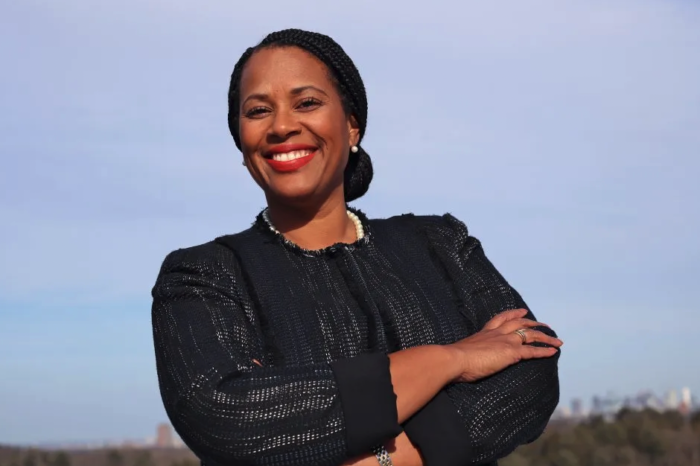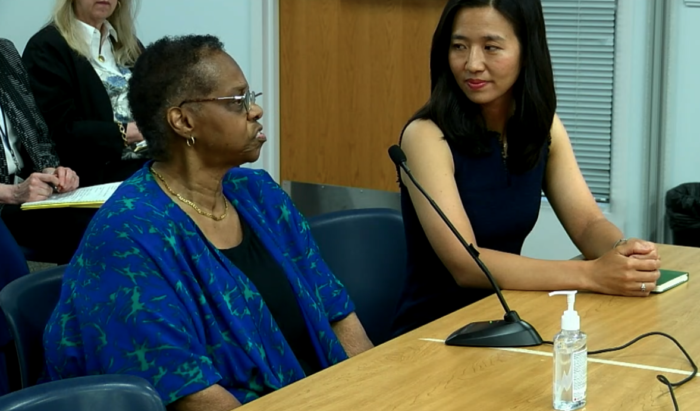
“I think one of the issues the next superintendent should focus on is how to best support students, specifically academically.”
With just days left before the BPS School Committee is expected to make its final vote to pick the next Boston Public Schools superintendent following a three-month search, this week NAACP Boston branch President Tanisha Sullivan asked committee members to “halt” the selection process.
“The process is fundamentally flawed and not consistent with the principles we have worked so hard to instill and advance across the district,” Sullivan, who is also running for secretary of the commonwealth, wrote in a letter to the committee chair. “The city deserves a representative slate of finalists. … Two finalists for a nationally respected district like Boston should raise an automatic caution flag in the process.”
Though Sullivan said she doesn’t specifically take issue with the two finalists for the superintendent spot—Somerville Superintendent Mary Skipper, and BPS Region 1 Superintendent Tommy Welch—she noted, “The lack of interest should serve as an indicator that we need to rethink our process AND timing. The process timeline was always too rushed for a district of this caliber.”

The NAACP president isn’t alone in feeling that the process has been inadequate. Since the announcement of the resignation of current BPS Superintendent Brenda Cassellius, who will receive more than $300,000 as part of a separation agreement despite leaving two years before her contract expires, Mayor Michelle Wu and her team have worked to find and interview the perfect candidate. Lawmakers, education advocates, and BPS families have been involved in the discussion, as have students to some degree. Overall, however, many in the latter group have found their contribution to be sparse, or even missing entirely.
As a demographic that will not only be most impacted by administrative changes but is also the most knowledgeable about many critical school-related issues, the student voice should seemingly be strongly represented. With that in mind, I asked BPS youth—my peers—how they felt about the resignation of Cassellius and the search drama that has come since, and also solicited their knowledge about and suggestions for BPS.
“I feel that BPS as a whole … needs to be more curated for the students; there are a lot of schools with different environments which need different sets of policies,” one high school student said anonymously. Regarding Cassellius, they added, “I don’t really feel informed too much about Brenda and what good things she has done for BPS, I only know the negative.”
Some respondents still have a bad impression of how school closures and protocols were handled during the pandemic. Another high school student said, “For the most part, I think she did alright; however, in the beginning of the year when COVID cases were high … many teachers and students including myself had to quarantine and miss days, and there wasn’t much of a solution.”
A lot of students felt disenfranchised from the current process, and said they’re largely uninformed about developments with the administration, the superintendent search included. Ailin Sha, a student at Boston Latin School, explained, “I really am not familiar with [Cassellius’] accomplishments [and] policies.” Brandon Douglas, a student at the John D. O’Bryant School of Math & Science, said, “I don’t believe that the youth were educated on who was running BPS. … I do not feel informed on this issue at all.”
Even students at some of Boston’s top schools said they were uninformed about district leadership, and most of the people we interviewed bemoaned a gap in information between Boston’s leaders and the people they’re supposed to serve, a situation which has likely contributed to larger BPS failures. The superintendent search came at the same time as the Massachusetts Department of Elementary and Secondary Education published a troubling review of BPS in May. This week, the district reached an agreement with the state to bolster student safety, special education, transportation, facilities, accountability, and other areas that need drastic improvement.

If that process, unlike the superintendent search, seriously solicits student input, administrators will hear about many of the same issues that people interviewed for this article noted. For starters, as one student said, “I think that the superintendent and school system can focus on improving school lunches.” They also hope new leadership can help “enforce better resources and access for students’ mental health.” “I feel like people in my school are tired and stressed at times and it can really affect how they work at school,” the student added.
As the search committee narrowed down its field to Welch and Skipper, we had questions about Boston’s communication with its students up to this point. We emailed BPS, and were sent to ask Mayor Wu’s office instead. Meanwhile, the advisory council tapped to channel input sent us the same message given to BPS students about how to watch interviews with the finalists online.
Some levels of communication do exist, but for many students, it hasn’t been enough, especially for anyone who wants specific details about candidates and their proposed policies.
“I think one of the issues the next superintendent should focus on is how to best support students, specifically academically,” Sha said. “In my opinion, managing COVID has prevented schools from being able to ensure all students are provided with the best resources for their success. As we return to a more ‘normal’ way of life, I hope the next superintendent will be more student-oriented in their policies.”
Sam Chen is a junior at Boston Latin School interested in advocating for other students, and learning about economics, education, and state policy.

